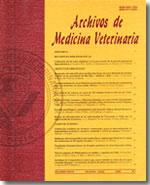Frequency of stereotyped abnormal behaviour in stabled Chilean horses
Main Article Content
Abstract
The frequency of stereotyped abnormal behaviour i.e. windsucking/crib-biting, weaving and stall-walking were studied in 100 Chilean horses of both sex, stabled in individual boxes either all day long or during a certain period of time. All horses were tamed and older than 2 years old, and belonging to 16 studs of the Comuna de Chillán (Chile). The horses were observed between 7:00 and 19:00 hours during one day, and its owner or carer was asked whether the horse presented some stereotyped abnormal behaviour or not. Horses were separated according to age into 2 groups: 2 to 5 years old and older than 5 years, and also according to sex: stallions, geldings or mares. Data was analysed using the Microsoft® Excel Worksheet to establish frequencies. Differences between groups were analysed by Exact Fisher’s Test. Significance level was P < 0.05. The results showed that 50% of the studs had one or more horses with some stereotyped abnormal behaviour. Ten porcent of the horses presented stereotyped abnormal behaviour. Stall-walking was the most frequent stereotyped abnormal behaviour (8%), then windsucking/crib-biting (2%), and finally weaving (1%). According to sex, statistic differences were observed only for stall-walking between stallions and mares (P = 0.012). According to age no statistic differences were observed.

